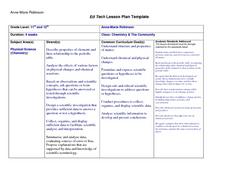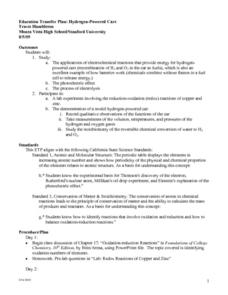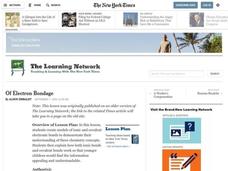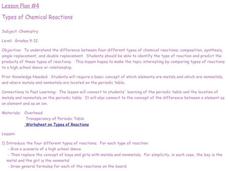Agency for Toxic Substances and Disease Registry
Don't Mess with Mercury (Lesson B)
At one point, people thought mercury was therapeutic for humans, but now we know it is highly toxic. The second of three activities covering mercury focuses on its health hazards if humans are exposed. Pairs research and answer questions...
Curated OER
Gases and Plasmas
Students determine what plasma is and why the sun is made up of plasma. They recognize situations where plasmas are found in nature and made by man. They discuss why the sun is a huge ball of plasma and if there are different levels of...
Alabama Learning Exchange
Float or Sink?
Experiment with mass and density as scholars figure out what makes things float or sink. First, they watch a podcast introducing these concepts. Be sure to use the comprehension question to test their understanding. Young scientists...
Curated OER
Properties of Metals
Fifth graders study the properties of metals and use them to identify different properties. In this metal properties instructional activity students complete a demonstration .
Curated OER
Speeding up the Fizz
Students investigate temperature and chemical reactions. They explore the effect of temperature and particle size has on the rate of a simple chemical reaction. In addition, they graph their results and answer assessment questions.
Curated OER
Chemistry & The Community
Students complete a Webquest which investigates the chemistry in items such as shampoo. They research the Internet, perform a lab experiment, and write a scientific lab report with their findings. Upon completion of the activities, the...
Curated OER
Oxidation and Salt
Students study the reaction on iron in water, air, and sodium chloride. They create a situation that shows this process and gives them the opportunity to hypothesize what, why, and how. They keep records and do an oral and written ...
Curated OER
Other Metals
Middle schoolers identify the properties of transition metals. In this chemistry lesson, students research facts and uses of one aluminum product they choose. They create an advertisement highlighting aluminum's useful properties.
Curated OER
Semiconductors
Students investigate the properites of a semiconductor device known as a diode. They recognize a diode as a one way conducting device. They describe alternating current and the use of a diode to convert it to direct current. Students...
Curated OER
Hydrogen Powered Cars
Students apply the principles of chemistry to investigate the concept of how a hydrogen powered car works. They study the electrochemical reactions that provide the energy source. Students also record observations in the functioning of a...
Curated OER
Mining an Ore
Students investigate how to determine the percent composition of a mineral in an ore. In this mining an ore lesson plan, students use chocolate chips cookies to represent an ore and they remove precious minerals (the chocolate chips)...
Curated OER
What is an Atom?
Third graders understand that the smallest particle is an atom. In this matter lesson, 3rd graders make a piece of aluminum smaller and smaller to see that what's left is still aluminum. Students recognize that cutting into smaller...
Curated OER
Ion (Derstand) Bonding through Energy Level Diagrams
Ninth graders investigate ionic bonding through energy level diagrams. For this ion bonding lesson plan, 9th graders observe demonstrations to show energy level diagrams using magnets to represent the subatomic particles. Students fill...
Curated OER
Nonmetals
Learners research about the chemical processes involved in cave formation. In this chemistry lesson, students draw or find a cave picture with stalagmites and stalactites online. They write a brief caption and share them with the class.
Curated OER
Edible Atom/Molecule
Upcoming chemists construct atom or molecule models out of candy. This is a classic idea that learners really enjoy; however, this lesson plan is vague. There is no instruction about the structure of atoms or molecules. Make sure you...
Curated OER
Combating Corrosion
Students perform an experiment to show the chemical reactions that occur when metal corrodes. They apply the results of the experiment to the conservation efforts of art curators trying to restore an ancient Greek bronze. This lesson...
Curated OER
Combating Corrosion
Study corrosion on bronze statues with a hands-on instructional activity. As pupils place a penny in water with salt, they observe the changes in the penny throughout a period of a week. They then analyze the pre-conservation and the...
Curated OER
Of Electron Bondage
Students create models of ionic and covalent electronic bonds to demonstrate their understanding of these chemistry concepts. They explain how both ionic bonds and covalent bonds work so that younger students can understand.
Curated OER
Properties of Matter (Biomaterial Through Nanotechnology)
Students investigate friction between different surfaces. In this physics lesson, students research biomaterials that can reduce friction. They calculate efficiency using a mathematical formula.
Curated OER
Chemistry: Balancing Chemical Equations
Eighth graders practice balancing chemical equations. In this chemistry lesson plan, 8th graders explain why it is necessary to balance equations. They complete practice worksheets individually.
Curated OER
Electron Arrangements
Pupils write electron configurations and identify groups. In this investigative instructional activity students use valence electrons to draw electron dot structures.
Curated OER
Types of Chemical Reactions
Students understand the difference between four different types of chemical reactions: composition, synthesis, single replacement, and double replacement and identify the type of reaction and predict the products of these types of...
Curated OER
Changes in Nature
Fifth graders explore changes in nature. They identify chemical and physical changes in the water cycle, carbon cycle, and weathering. Students explore a chemical or physical change based on a chemical formula. They examine the effects...
Curated OER
Chemistry: Metals and Non-Metals
Students conduct an experiment to test the reactivity of metals and non-metals. In this chemistry instructional activity students test metals with different chemicals to observe the reaction. The results are used to categorize the metals.
Other popular searches
- Periodic Table of Elements
- Periodic Table of the Elements
- Periodic Table Elements
- Periodic Table and Elements
- Periodic Table Elements Unit

























